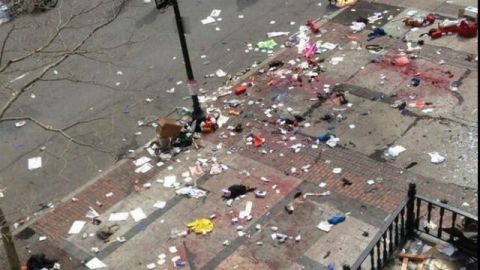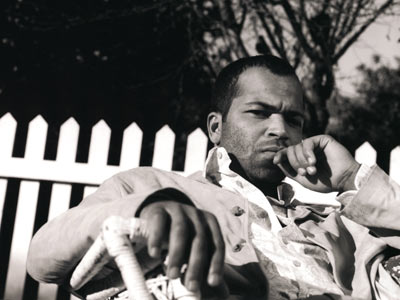The Boston Marathon Bombing. Why Terrorism Works

So how terrorized will we be this time? Maybe terrorized is too strong a word. But how much more worried will we be, how much more uneasy, how much more unsettled will we feel as we go about our normal lives, now that the bombing attack at the Boston Marathon has again reminded us that we are not as safe as we like to think we are, that angry violent people are out there, ready in their madness to kill and hurt vulnerable innocent defenseless people? People like us.
Was this the act of foreign anti-American Islamic extremists, like those who turned airplanes into bombs on September 11th, 2001? Perhaps it was the rage of a homegrown anti-government militia group, like Timothy McVeigh and accomplices Terry Nichols and Michael and Lori Fortier, who detonated a truck bomb outside the Murrah Federal Building in Oklahoma City in 1995 that killed 168 people and injured 680? Yesterday was, after all, Patriot’s Day in Massachusetts, a holiday commemorating the start of the Revolutionary War, when people with “free and fiercely independent spirit”, as President Obama put it in describing Bostonians, were ready to kill out of anger at an oppressive government.
Or does it really matter who it did it, or why? Maybe what matters most to our sense of vulnerability is just to be reminded of it, however it happens, whoever does it, for whatever motive. Terrorism works precisely because the details don’t matter. It’s scary because it can happen anywhere, anytime, to anybody, and it can be done by anyone whose anger drives them to murderous madness. It’s so random. So unpredictable. So easy to do. Against all that uncertainty, and our inability to keep these things from happening, we feel so powerless to protect ourselves. That is terrifying.
And it catches us so off guard. It rips us so harshly and suddenly out of our comfort and complacency, calling up from our subconscious the always lurking but mostly suppressed truth that we are never as completely safe as we tell ourselves we are. Against our routine lives and normalcy, the out-of-the-blue suddenness and brutal violence of these attacks summons our survival instincts with a wrenching power. A friend of mine who was at the finish line to watch her 20 year-old daughter run by was just yards away from the larger explosion. She wept as she described the emotional violence of the change; “We were waiting for Jesse to show up, and then it went from this moment where we were so excited to this just horrendous event.”
Certainly the details do matter. The specifics of who does it, and why, and where, gives each of these attacks their own unique emotional impact. McVeigh and his fanatic militia partners killed 19 children and injured dozens more by placing their bomb outside a day care center. The scale of 9/11, and the imagery of those burning collapsing buildings, were horrible. And yesterday’s bombings at the marathon were uniquely shocking because they came during a big civic celebration, one of those festive public parties when all the differences between people melt away and tens of thousands of people are all connected, all on the same positive emotional wavelength as they share a rare happy unity. A TV reporter who was just feet away from the larger of the two explosions – the one right near the finish line – put it this way; “It was the perfect day. It was a showcase of everything that is good. And then in that moment…it was a moment of the most terrible possibility realized. If this isn’t safe, what is?”
The details of each attack also impact how much fear they create because with any potential threat we are always trying to figure out “can that happen to me?” Attacks in big cities cause more worry to those who live or work in cities than to residents and workers in small towns. An attack on a festive crowd on a symbolic date makes attending other large gatherings on symbolic dates – July Fourth civic fireworks displays – feel scarier. If you fly, an attack by someone who tries to blow up their sneakers or underwear on a plane worries you more than if you only ride the bus or take the train. We look for patterns in the details that help us gauge just how vulnerable we personally might be.
And of course we want to know, need to know the details of each attack, because knowing who did it and how and where and why gives us a sense of control and the belief that by understanding these details, we can prevent similar attacks. Certainly that does help. There might have been more of these but for the investigation of all those earlier attacks that helped authorities thwart more recent attempts. But then something like this happens, and it reminds us of how random these things actually are, and how we can’t protect ourselves completely, and how false our sense of security actually is.
Most of the time, of course, we are safe. And even when these horrific attacks occur, in the big picture, the casualties are few. Statistically, the risk of terrorism is tiny. But none of that matters to how scary it feels, just as the details of each attack don’t really matter. Anytime some maniac turns anger and hatred and mental illness into violence, and the smoke rises as the ambulances carry away the dead and injured, we are reminded that we are vulnerable…that it really can happen anytime, anywhere, to any one of us. That’s why terrorism works.
As it did after Oklahoma City, and 9/11, the acute fear will fade. It always does. We can’t live our lives on constant high alert. But it won’t disappear. It won’t ever completely go away. That’s the broader evil of what happened in Boston yesterday. It’s another invasive, corrosive reminder that we are vulnerable, and that we are not, nor can we ever be, as safe as we would wish.





